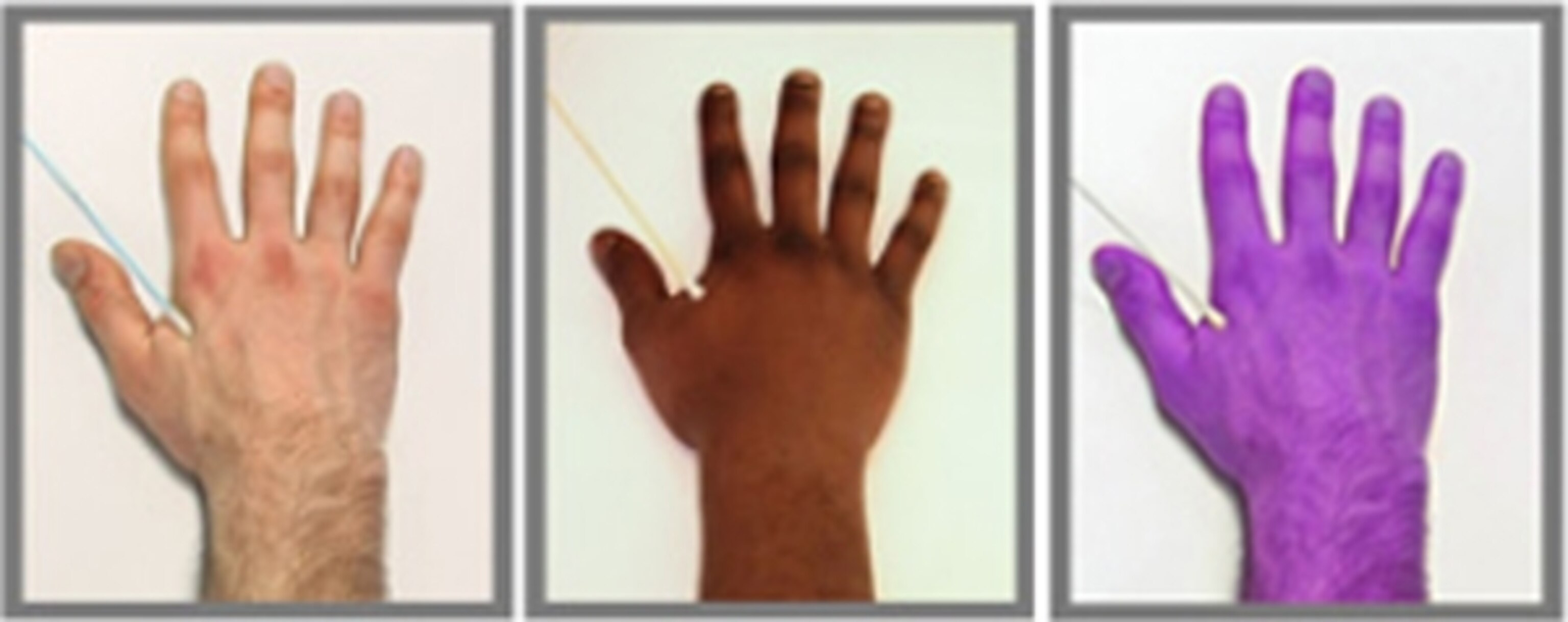
Racial bias weakens our ability to feel someone else’s pain
You’re watching a video of a needle piercing an anonymous hand, sinking slowly into the web between the thumb and index finger. You wince as you imagine the pain that the other person must feel, and for good reason. As you watch, you nervous system essentially duplicates the experience, responding as if you were vicariously feeling the pain yourself. This is typical of what happens when people see others in pain, but Italian scientist Alessio Avenanti has found an important exception to the rule. Racial bias can negate this ability to feel the pain of someone from a different ethnic group.
Avenanti recruited white and black Italian volunteers and asked them to watch videos of a stranger’s hand being poked. When people watch such scenes, it’s actually possible to measure their brain’s empathic tendencies. By simulating how the prick would feel, the brain activates the neurons of the observer’s hand in roughly the same place. These neurons become less excitable in the future. By checking their sensitivity, Avenanti could measure the effect that the video had on his recruits
He found the hallmarks of an empathic response only when the hands in the videos were prodded by a needle rather than a blunt piece of plastic, and only when he took measurements at the same part of the hand. But most interestingly of all, he found that the recruits (both white and black) only responded empathetically when they saw hands that were the same skin tone as their own. If the hands belonged to a different ethnic group, the volunteers were unmoved by the pain they saw.
So are we all just naturally and worryingly prejudiced? Far from it – Avenanti actually thinks that empathy is the default state, which only later gets disrupted by racial biases. He repeated his experiment using brightly coloured violet hands, which clearly didn’t belong to any known ethnic group. Despite the hands’ weird hues, when they were poked with needles, the recruits all showed a strong empathic response, reacting as they would to hands of their own skin tone.
The purple-hand experiment is a vital part of Avenanti’s study. Other scientists have suggested that people are less responsive to the pain of other ethnic groups, simply because their skin tones are less familiar and harder to identify with. But what could be more unfamiliar and less identifiable than a violet hand? It’s strong evidence that the lack of empathy from the first experiment stems not from mere novelty, but from racial biases.
Avenanti also found that the stronger these biases are, the weaker their empathic response. Each of his recruits did an ‘Implicit Association Test’, which looks for hidden biases by measuring how easily people make positive or negative connections between different ethnic groups. For example, white Italians are typically quicker to associate positive words with the term “Italian” and negative ones with the term “African”. And the faster they make those connections, the greater the differences in their responses to the stabbed black and white hands.
The recruit’s bodies betrayed their prejudices in other ways. On seeing the penetrating needles, their skins became moist and better at conducting electricity, a reflexive sign of emotional arousal. The needles evoked the same effect regardless of the hand they pierced, but the response was longer in coming if the hand belonged to a different ethnic group.
All in all, Avenanti says when we see pain befall a person from our own racial group, it immediately triggers resonant activity in our own nervous system. When we see the same event happening to someone of a different race, these simulations are weaker and take longer to form.
It’s a sad state of affairs but probably not an unpredictable one. After all, other studies have found that racial prejudices can make us dehumanise members of a different ethnic group. But more promisingly, Avenanti’s experiments suggest that things don’t have to be this way. Our default reaction, freed from the shackles of prejudice, is empathy with our fellow people, even if they do have freaky violet hands.
Reference: Current Biology http://dx.doi.org/10.1016/j.cub.2010.03.071
More on race:
- Williams syndrome children show no racial stereotypes or social fear
- Even on mute, TV can perpetuate racial bias
- How light or dark is Barack Obama’s skin? Depends on your political stance…
- Social status shapes racial identity
- People overestimate their reactions to racism
- They don’t all look the same – could better facial discrimination lead to less racial discrimination?
//
